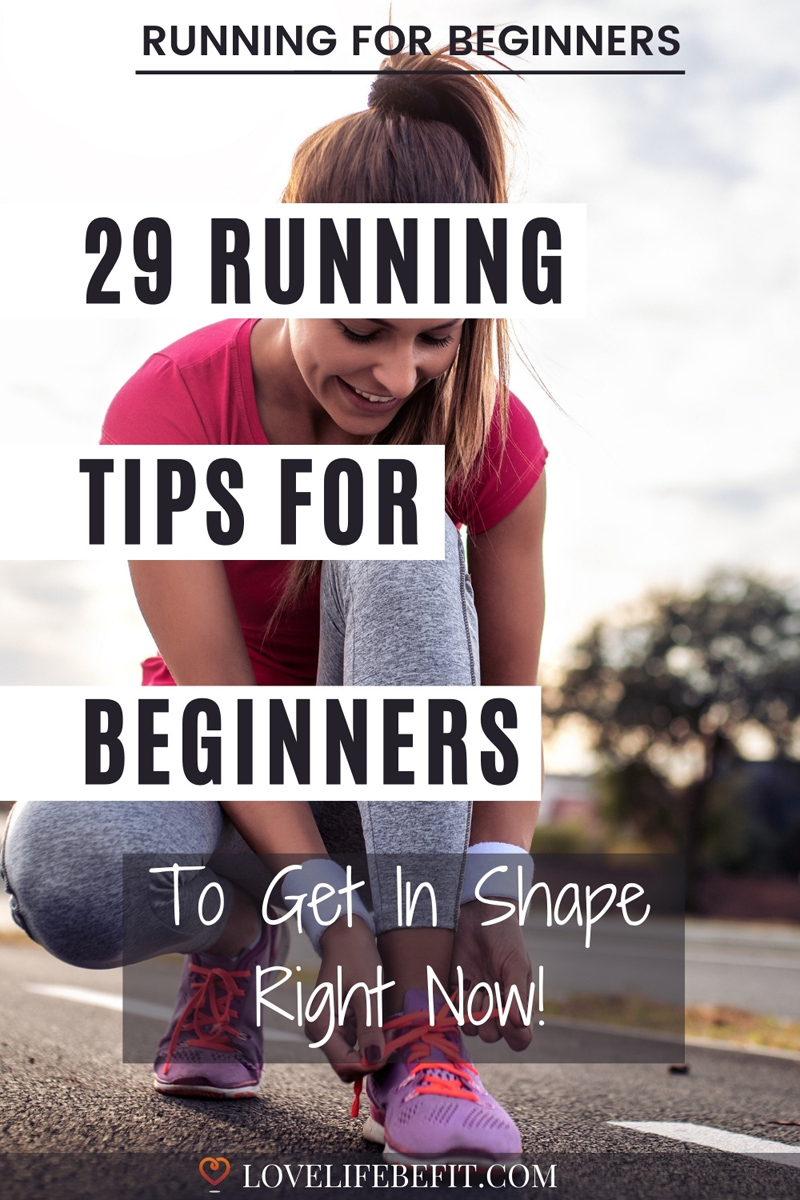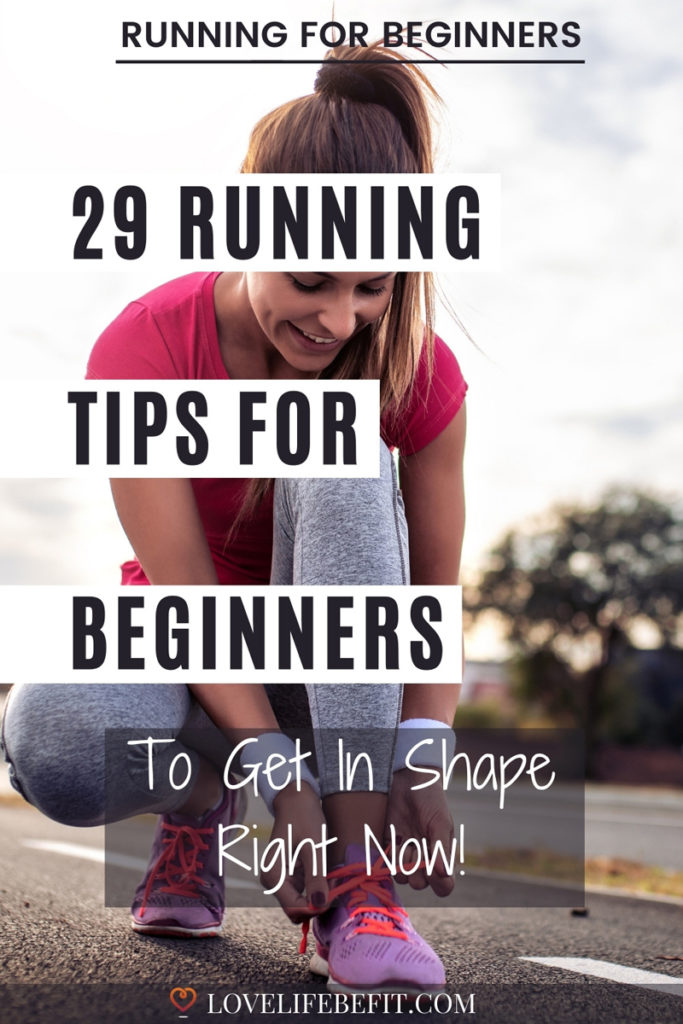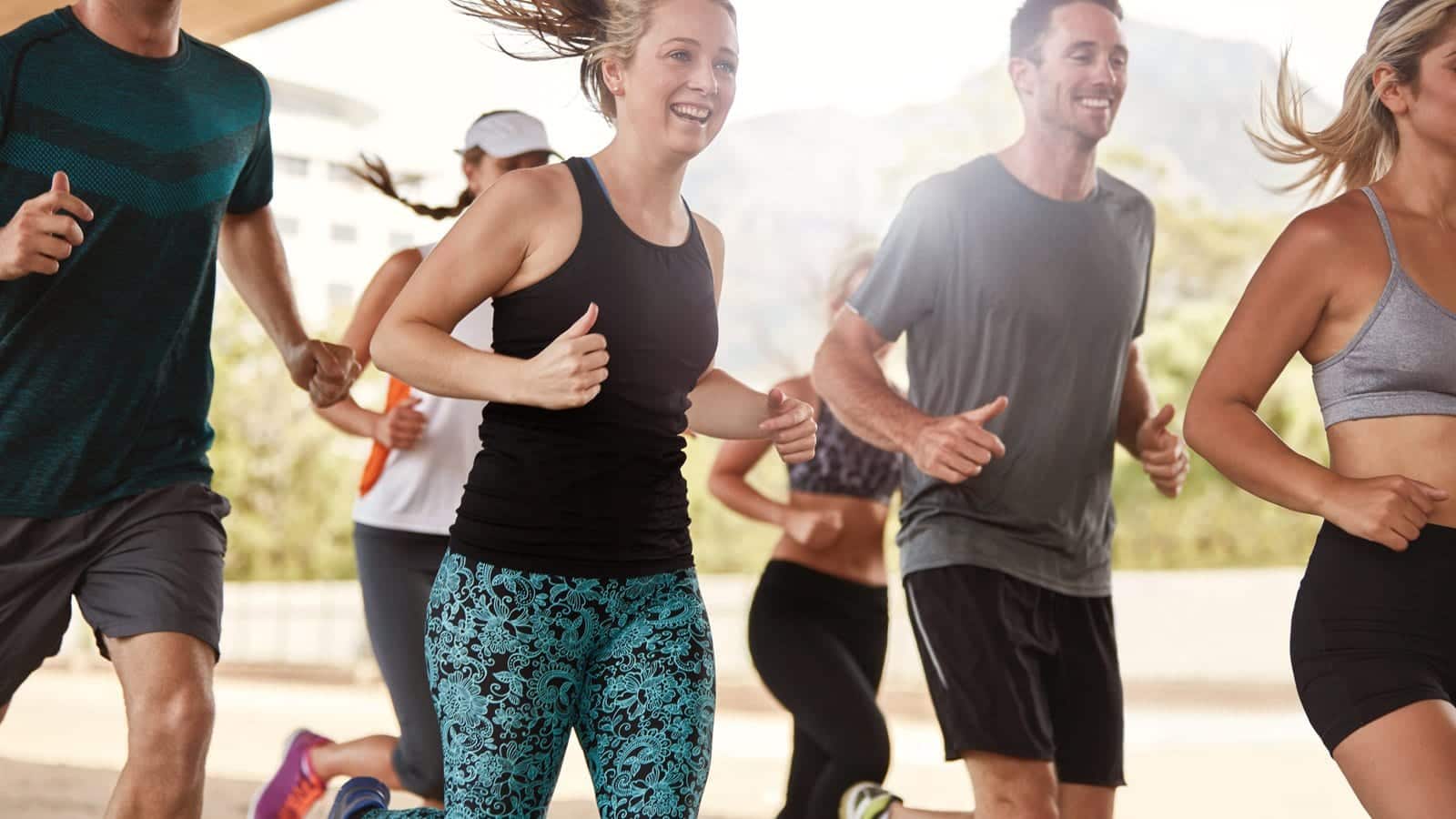29 Running Tips For Beginners (Start Your Training Now)
Running is one of the best ways to get in shape. If your goal is weight loss, it’s a great way to burn calories but getting started is a huge challenge! Even if you’re already used to exercising your first run can be daunting. These running for beginners tips will help you ease into your first few runs, learn how to breathe properly, and get used to running continuously. Discover how to train consistently, and avoid the risk of injury, as you discover your passion for all things running…
My 5 Step Guide for Complete Beginners will help you start running or read on for tips to go from running newbie to seasoned pro!

Beginner Running Tips For Getting Started
Preparation is key when you first start running or if you’re returning to running after a long break. There are a few things to think about before launching into a running program. If you have a lot of excess weight, the best way is to start with a walking plan first – this walking for weight loss plan will get you ready to run.
#1 Check-In With Your Doctor
If you haven’t exercised for years it’s best to get some medical advice first. Get a thumbs up from your doctor before you lace up your shoes.
#2 Prepare
Get a good pair of running shoes (and don’t forget your sports bra). If possible seek some advice from a specialist store to find the right shoe. You can start out in any loose clothing but good shoes are essential.
Make sure your running shoes are comfortable and they fit correctly. The best shoe will feel good as soon as you slip it on. It’s worth getting some proper running socks – you can thank me later!
#3 Find Your Motivation
It’s easier to stick to a training plan if you know why you’re running. Write down your motivation and stick it somewhere you can see it every day. I find a few motivational running quotes also help!
It can be anything from being fit enough to play footie with your 5-year-old in the backyard to losing weight and being just a bit healthier.
#4 Warm-Up
Don’t sprint from your front door – it’s a good way to get injured. Warm up first with some dynamic stretching and running drills. It’s a good way to make sure your legs don’t feel heavy when you start to run.
#5 Take It Slow
No one becomes an amazing runner overnight and overdoing it in your first few weeks is a dead cert for getting injured. Taking it slow is probably the best running tip for beginners.
Use the run-walk method. Start by warming up for 5 minutes with a brisk walk. Then alternate 1 minute run at an easy pace with 1 minute of walking at a fast pace for no more than 20 minutes at a time.
Easy pace means you should still be able to talk!
#6 Take Walk Breaks
You’re only competing against yourself. Don’t try and keep running when you really start to struggle. Take walking breaks then try again.
#7 Find A Running Program
You don’t have to do this on your own. A beginner running program will help you stay on track and most importantly not get carried away. The Couch To 5K Program is one of the best and a great place to start when you’re new to running.

Running Tips For Improving
There’s a lot to take on board when you first start to run from finding your proper running form to being able to breathe. Running will seem hard at first – almost impossible. But trust me – follow these tips and stick at it. Running will get easier! You’ll love your emerging runner’s body!
#8 Learn How To Run
Not everyone’s a natural runner – at least not adults. Desk jobs and sitting all day messes with our ability to run. Understanding proper running form and working on your technique will get your running off to a good start.
#9 Get Strong
Strength training can really help new runners and it’s important for injury prevention. Those wobbly legs need toughening up. Adding strength training to your regime will make you a better runner.
#10 Learn How To Breathe
When you run for the first time, it’s hard to get your breathing right. These tips will help you control your breathing and breathe from your gut.
#11 Find The Right Pace
Beginner runners find it hard to set the right pace. Set off too fast and you’ll be flagging by the halfway point. An efficient runner runs at a consistent pace. Find out how fast you should be running.
#12 Understand RPE
The Rate Of Perceived Exertion is how hard you feel your body is working. It’s a better way for new runners and old hands to target the intensity of their runs. Find out more about RPE and why it’s an important training tool.
#13 Build Weekly Mileage Gradually
The rule is no more than a 10% increase in mileage every week and a 10% increase in the length of your long run. Build your mileage gradually when you take up running and don’t get carried away.
Find out how to run longer without getting tired.
#14 Rest Day
Okay, I know you’re trying to get fit! But if you start by running every day, your body will hate you. Stick to alternate days until you’re used to the new regime. Your body will adapt – just give it a bit of time!
Even when you’re an experienced runner, it’s a good idea to have at least one rest day or easy day every week.
Nutrition and Hydration
You may be running to lose weight but you still need to be mindful of your body’s needs when you start to run. These beginner running tips for nutrition and hydration will help you refuel correctly during your runs.
#15 Stay Hydrated
You can get thirsty really quickly as a new runner, especially if you’re running in the heat. Carry a bottle and stay hydrated! Dehydration can be debilitating or even dangerous.
For longer runs make sure you replace lost sodium and electrolytes with a sports drink. It’s best to drink to thirst and make sure you understand the dangers of over-drinking. Sports drinks are better during exercise than water.
#16 Drink Before You Run
Just set off for a run already dehydrated. Make sure you drink adequately in the hours leading up to your run. For long races, such as a half marathon or further, make sure you’re drinking adequately the day before. Water is best.
#17 Don’t Run Out Of Energy
As a beginner runner, you won’t be running for more than an hour. Your body’s energy stores will get you around your run. Just make sure you have breakfast first if you’re running in the morning and give your body time to digest your food.
During longer runs, you need to top up your carbohydrate levels. After the first 60 to 90 minutes of exercise, aim to eat 1g of carbs per 1 kg of body weight per hour.
#18 Post-Run Top Up Your Muscle Glycogen
It’s best to eat something within 30 minutes of finishing your run. Go for snacks with both carbs and protein. If you’re running to lose weight a top tip is finishing your run and then eating your main meal – once you’ve caught your breath of course!

Beginner Running Tips For Staying On Track
The first few weeks of running can seem tough but the excitement of improving and doing something new keeps you going. It’s the long-term motivation that can sometimes be more challenging.
#19 Find A Buddy
It’s so much easier to stay motivated when you’re running with friends. Find a running buddy or join a road runners club that welcomes beginners. It will definitely help.
#20 Using A Personal Trainer
If you have the funds, a personal coach can make a big difference. Make sure the one you use is a good match for your goals and personality.
#21 Set A Goal
One big tip is to set 3 monthly goals. Always looking 10 to 12 months ahead will give you something to aim for. It’s about the right sort of time to train for your first 5K or if you’ve done some running before, train for your first half marathon.
#22 Race
Racing isn’t essential as a runner but it’s so much fun and definitely helps to keep you motivated. It also helps you realize there are runners of all levels.
If you’re a slow runner, that’s okay. Running at the back of the pack can be just as enjoyable. Take friends and family along on race day for some support!
Running Conditions
If you’re going to be a runner, you can’t wait around for the perfect weather conditions. Hot, cold, wet, windy, and even snow, most runners will head outside. Here are some tips to help you cope…
#23 Wet Weather Running
It’s safe to run in the rain if you avoid extreme weather such as thunderstorms. Stay dry with a good running jacket and a baseball cap will keep the rain off your face. Running in the rain can take some extra motivation!
#24 Hot Weather Running
Slowing down and staying hydrated are some of the best tips for running in the heat. Try and avoid running in the heat of the day and understand the risks of heatstroke and heat exhaustion.
#25 Cold Weather Running
On cold days wrap up warm and wear a softshell to block out windchill. Never underestimate how cold you can get 10 miles into a long run.
Just because you’re running doesn’t mean you won’t get cold. Make sure you’re wearing the right running clothing.

Tips To Become A Better Runner
Don’t worry about running faster or trying to run really long distances in your first 6 months to 12 months of running. Your body needs to gradually get stronger. After your first year of running, it’s time to work on improving.
#26 Running Faster Or Further
In my view, speed is always your friend. You need to be a faster runner to comfortably run longer distances. Running intervals and speedwork sessions are important for all improving runners. Follow these tips for how to run faster.
#27 Work On Your Mile Speed
Improving your mile speed will make you a faster runner over longer distances. It’s much easier to run a good marathon if you’re running comfortably under your fastest mile pace.
#28 Run Longer Without Getting Tired
From mental strength to good pacing and training, there’s a lot that goes into becoming a better long-distance runner. Find out more in this post – How to run longer without getting tired.
#29 Improve Your Running Stride
Tight hip flexors directly affect your running stride, reducing the range of motion of your hips and compromising your natural gait. Fix any problems with these tight hip flexor stretches.
Thoughts From Love Life Be Fit
Hopefully, these beginner running tips will help you become a consistent runner. Finding ways to stay motivated is really important when you first start running.
Exercising at the same time every day can help. Here’s what happened when I ran 5 miles every day. Make running a part of your daily routine – you’ll love the results!








